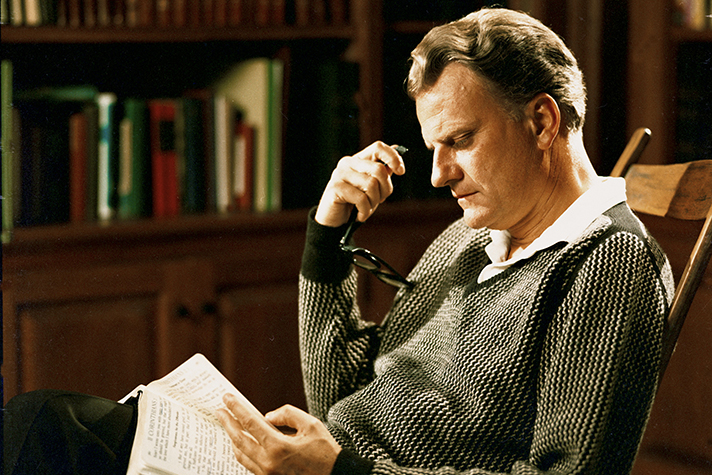
“Faithful.” When interviewers asked Billy Graham how he wanted to be remembered, the evangelist nearly always worked faithfulness into his answers.
“I want to be remembered as a person that was faithful to God, and faithful to my family, and faithful to my calling,” said a 74-year-old Graham in one such interview on ABC’s “Good Morning America.”
It’s one of nine traits the Bible references as evidence of the Holy Spirit’s work in a human heart (Galatians 5:22–23). But while many people seek to become more loving or peaceful, few name the spiritual fruit of “faithfulness” as a life goal.
Perhaps that’s one reason why the world weighed in when Billy Graham passed away on Feb. 21, 2018. In the weeks that followed, the same news networks that once hosted the evangelist reported on his 99-year example of consistent character—as a motorcade transported his casket across his home state of North Carolina, as he lay in honor in the U.S. Capitol, and as his funeral was broadcast to millions in more than 100 countries.
“His message never changed,” said television host Kathie Lee Gifford, who attended the March 2, 2018, funeral service at the Billy Graham Library. “There was just a purity about the man. And his walk with Jesus was so real. And his love not just for his Lord, but for people.”
It’s a rare story in a world rocked by the scandals of men and women who aren’t faithful to God, their families, or their callings.
“I think that a person’s end ought to be better than his beginning,” Mr. Graham said as his journey on earth neared its conclusion.
Five years after his passing, it’s easy to see how faithfulness marked the evangelist’s life—from beginning to end.
Billy Graham’s life began on Nov. 7, 1918, a fall day, in Charlotte, North Carolina.
His early years were simple, filled with farm animals and dreams of playing professional baseball. But the course of his life was forever changed when the 15-year-old personally committed his life to Christ at a revival meeting in his hometown.
After graduating from Florida Bible Institute and Wheaton College, and pastoring for a short time, Billy Graham became the first full-time evangelist with Youth for Christ, preaching the Gospel at rallies in the United States and Europe.
But his commitment to Christ wasn’t without challenges. In 1949, he faced an unexpected struggle when a close friend and fellow evangelist tried to convince him to stop believing that the Bible is trustworthy. During one sleepless night, Mr. Graham laid his Bible before God and uttered a pivotal prayer: “Father, I am going to accept this as Thy Word—by faith! I’m going to allow faith to go beyond my intellectual questions and doubts, and I will believe this to be Your inspired Word.”
Mr. Graham considered that moment a turning point in his life and ministry. A few weeks later, at his historic Los Angeles Crusade, the response was so overwhelming it caught the attention of major newspapers. Almost overnight, Billy Graham became a household name.
Soon, the former farm boy’s life became much less simple.
For many years, he traveled nearly nonstop, eventually sharing the Good News in more than 185 countries and territories. He advised world leaders, including meeting with every U.S. president from Harry Truman to Donald Trump. He founded the Billy Graham Evangelistic Association (BGEA), using innovative technology to spread the Good News by print, radio, and television.
But Billy Graham knew he couldn’t remain faithful to God, calling, and family—including his beloved wife, Ruth, and five children—in his own strength.
As early as 1948 in Modesto, California, the evangelist gathered his ministry team to discuss how they could avoid the temptations that caused other Christians to stumble. What resulted were four resolutions about financial integrity, sexual morality, transparent reporting, and partnership with local churches.
“It did not mark a radical departure for us; we had always held these principles,” Mr. Graham said of the Modesto Manifesto, which has since been adopted by many pastors, ministries, and organizations. “It did, however, settle in our hearts and minds, once and for all, the determination that integrity would be the hallmark of both our lives and our ministry.”
Those principles are now a part of his legacy, informing how BGEA raises support, protects staff, reports numbers, and interacts with churches in its continued efforts to spread the Gospel by every effective means.
“We can be faithful, by the power of [God’s] Spirit, to honor Him and join Him in His mission of redeeming men and women, boys and girls, to Himself,” said BGEA President and CEO Franklin Graham.
And when life becomes challenging, we can rely on God’s strength to remain faithful, as Mr. Graham did.
“I’m sure I’ve failed in many ways,” Billy Graham said, “but I take comfort in Christ’s promise of forgiveness, and I take comfort also in God’s ability to take even our most imperfect efforts and use them for His glory.”

